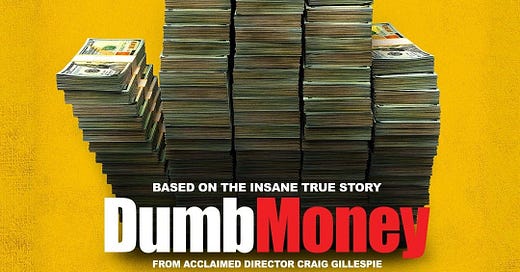Remember the GameStop (GME) saga? Many of you probably lived it.
Well, Craig Gillespie decided to make a movie about it three years after the fact.
Although entertaining, there’s nothing subtle about “Dumb Money.” It’s an underdog story, pitting Wall Street hedge funds against retail traders.
Yes, the movie practically drips with social commentary and digital age populism. About halfway through, the Keith Gill character pretty much sums it all up:
Future generations will look back and say ‘Good men stood here, good men fought, and died on this ground,’ as they point to a TradingView daily chart of GME zoomed in on January.
Since the spawn of the stonkmarket, two classes of people have been pitted against each other. Eternal enemies, forever forced and fated to combat: lions and hyenas.
These lions, these Wall Street hedge funds have it all. Billions of dollars, bail outs for reckless trades, these dirty fucking criminal bastards.
And then there’s us. The working man, the average Joe.
What do we have? What the fuck do we have?
They literally call us ‘dumb money.’ These lions, these hedge funds guys, were born with silver spoons in their mouths. The top 1% of the 1%. They have massive bank accounts, eat medium-rare, Grade-A Wagyu steak with truffle shavings for lunch. They frequent the finest strip clubs. They have blow and escorts on their yacht parties. Then, you know what they tell these escorts? When the smoking hot blonde asks them, ‘Like, how do you have so much money?’
You know what they say?
They say ‘Ha, dumb money babe. Dumb money.’
The $GME trade is about class warfare. Plain and simple. We may be hyenas, yes. But guess what? You put enough of us together, and we can destroy a lion.
How dramatic.
However, there’s just one teensy-weensy, but ever so crucial little detail.
GME is back at 2008 levels and a lot of diamond hands got rekt:
Turns out, the hyenas didn’t destroy anyone.
Even the movie’s main antagonist, Gabe Plotkin, who was forced to shut down Melvin Capital, is doing A-okay in real life.
Plotkin has since started a new fund out of Miami Beach called Tallwoods Capital LLC (just one year after GME), and his personal net worth is estimated at $400M. He also wins for most punchable face:
Just kidding.
I’m sure he’s a great guy.
Or not. Who cares.
But here’s what is worth thinking about:
Social media turned retail traders into a type of swarm intelligence that was able to identify and single out vulnerable hedge funds. Short interest on GME was over 100% of the float, indicating that more shares had been shorted than existed in circulation - an insanely precarious and reckless position to be in as a professional trader. It means short sellers couldn’t even plausibly buy back enough shares to cover their position, if the price rose against them. They were in over their skis. Using retail trading apps, the internet took full advantage and triggered a massive short squeeze.
This would not have been possible ten years ago, a jarring realization that hasn’t been lost on Wall Street - the hunter can now become the hunted. Mistakes no longer go unnoticed, and will be exploited. Compared to the internet’s collective intelligence, even the smart money is pretty dumb.
Case in point - Bitcoin.
The internet has been front running the supposed smart money for 15 years now. Soon most Americans will have Bitcoin exposure through their insurance plans, pension funds, 401(k)s, and IRAs. It's as simple as ETF issuers including their BTC products in a standard recommended portfolio.
Meanwhile, the legacy institutions still can’t even touch the stuff! Powerful interest groups, including Bank Policy Institute, the American Bankers Association, the Securities Industry and Financial Markets Association, and Financial Services Forum, are practically begging the SEC to make guidance changes that will let them hold digital assets. FOMO is hitting hard.
This is markedly different from GME, which is just another stock in the legacy system. Using it as a cudgel against the incumbents was always bound to fail. It’s like trying to bankrupt a casino by beating its slot machines. It’s never going to happen. Even you win, they’ll just claim malfunction and stiff you.
That’s why Plotkin is doing just fine.
Bitcoin, on the other hand, is a totally different beast.
They can’t short it without getting wiped out, they can’t print it, bailouts reward BTC holders, they can’t turn off the buy button on exchanges (yes, that really happened.) And even after 15 years, Wall Street still doesn’t grok it.
They missed 2008 because they thought trading mortgage-backed securities were a lucrative business. In reality, they were picking up pennies in front of a steamroller. Shorting the housing market was the trade of the decade.
They’re now missing Bitcoin for the same reason, except this time it isn’t just real estate - it’s the entire system. Again, they’re on their knees, scrounging around for nickels and dimes. In reality, shorting the collapsing legacy system is the trade of the century. Bitcoin is the ultimate short squeeze because everyone is short Bitcoin.
Wait until the GME crowd figures this one out.
If you’ve enjoyed this Sunday edition of the Bitcoin Macro Newsletter, please help spread the word by sharing this post with friends and colleagues. We rely on your good word of mouth. Any pledges are greatly appreciated.







Well laid out and explained